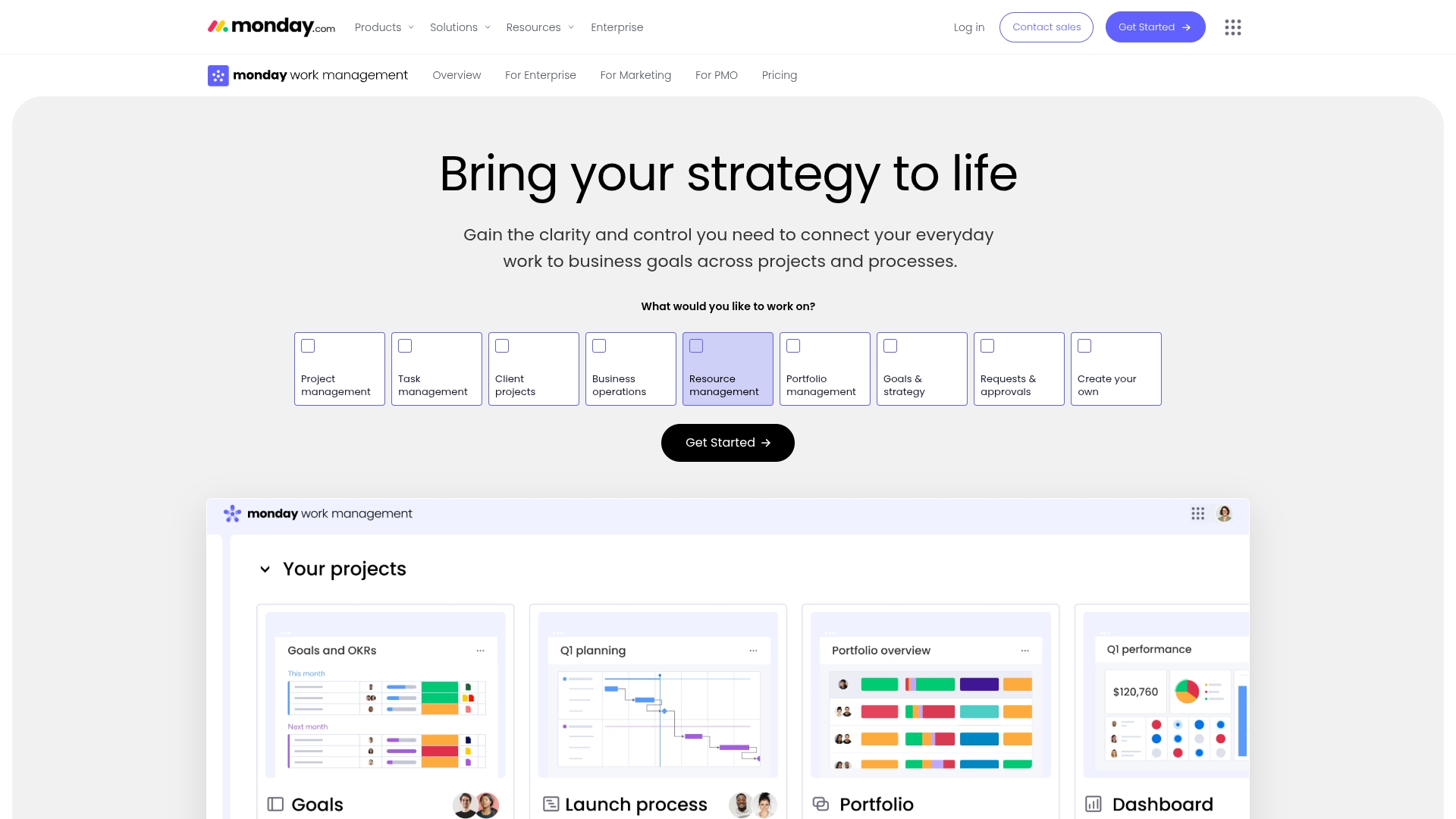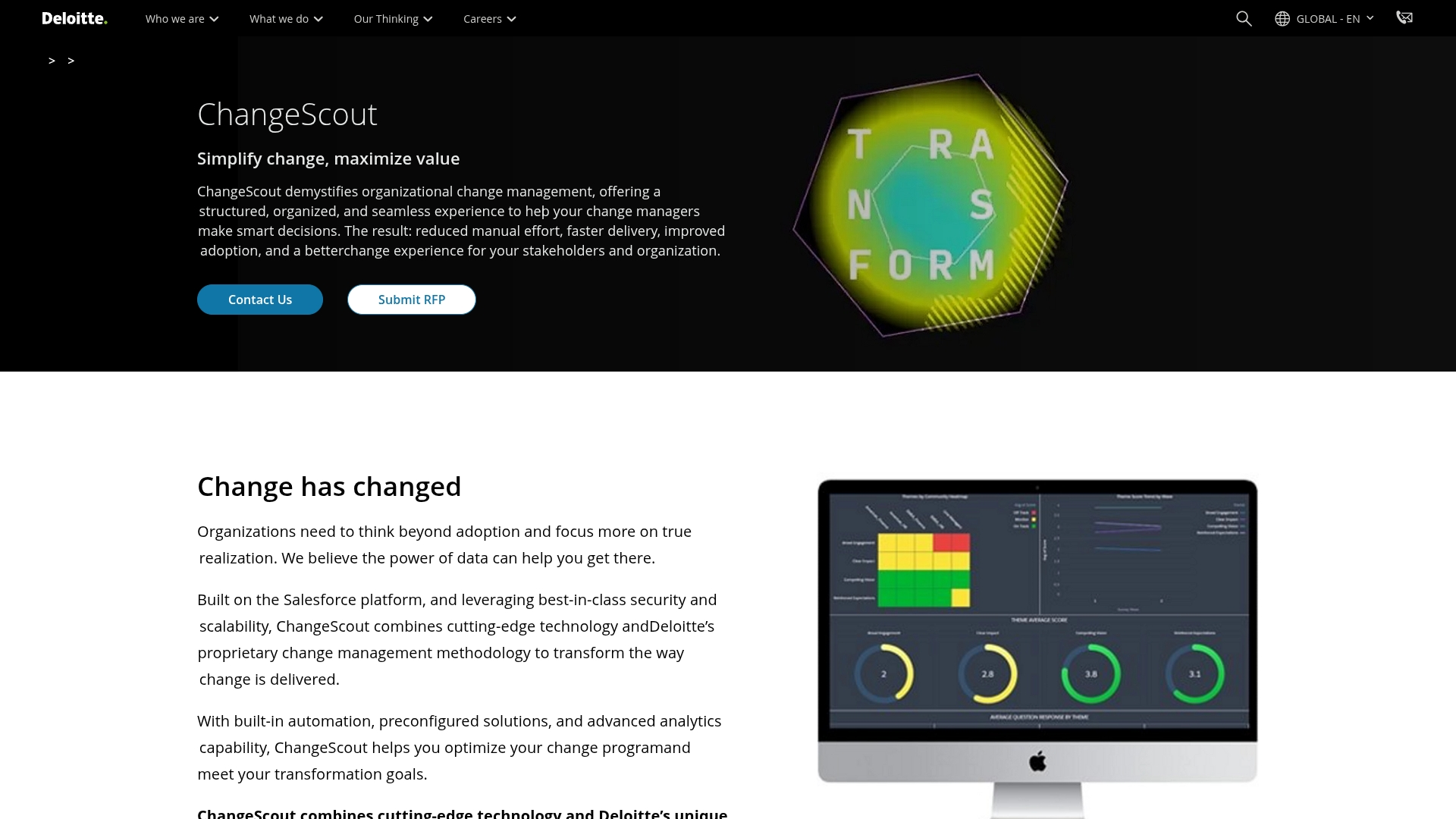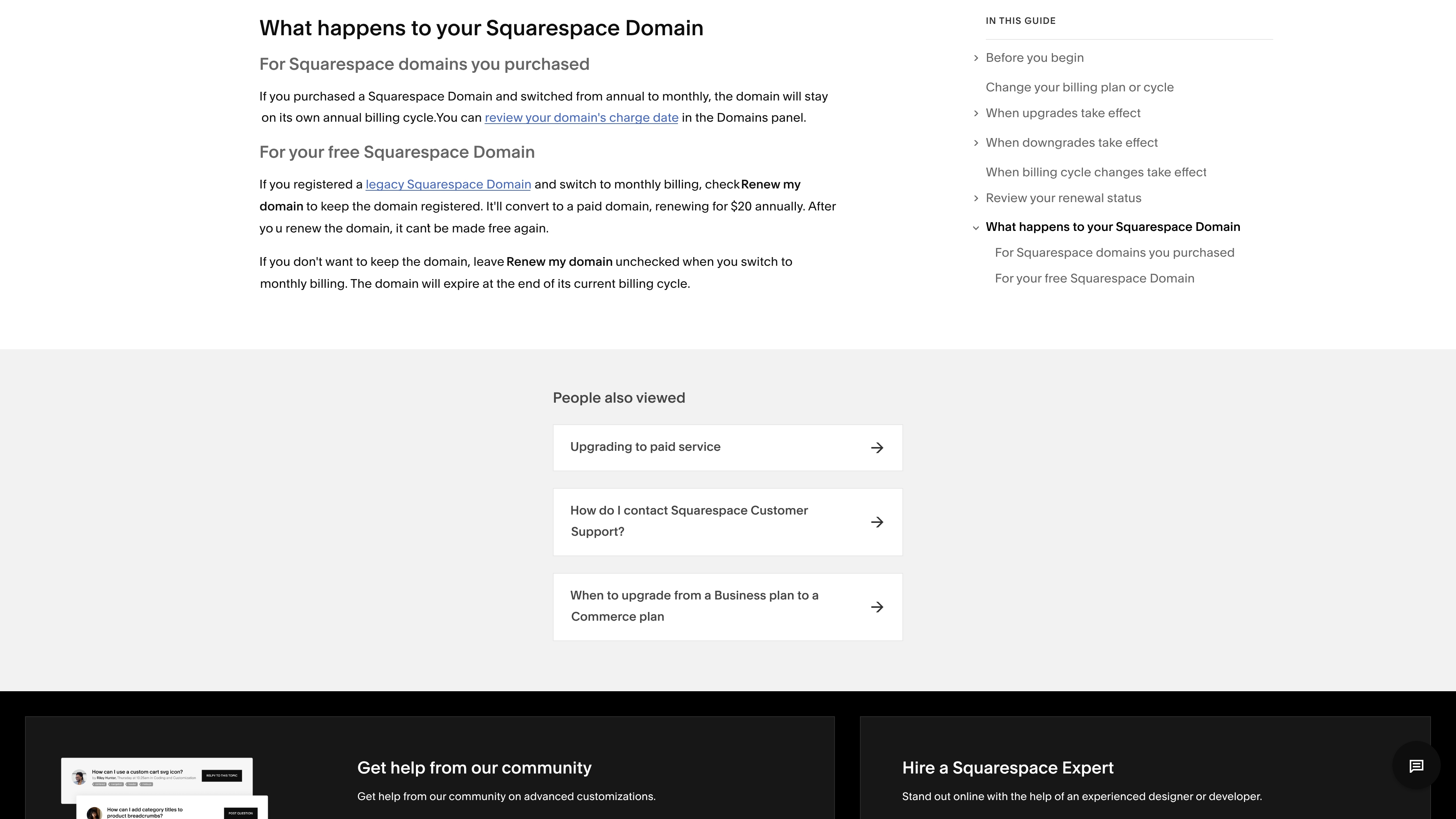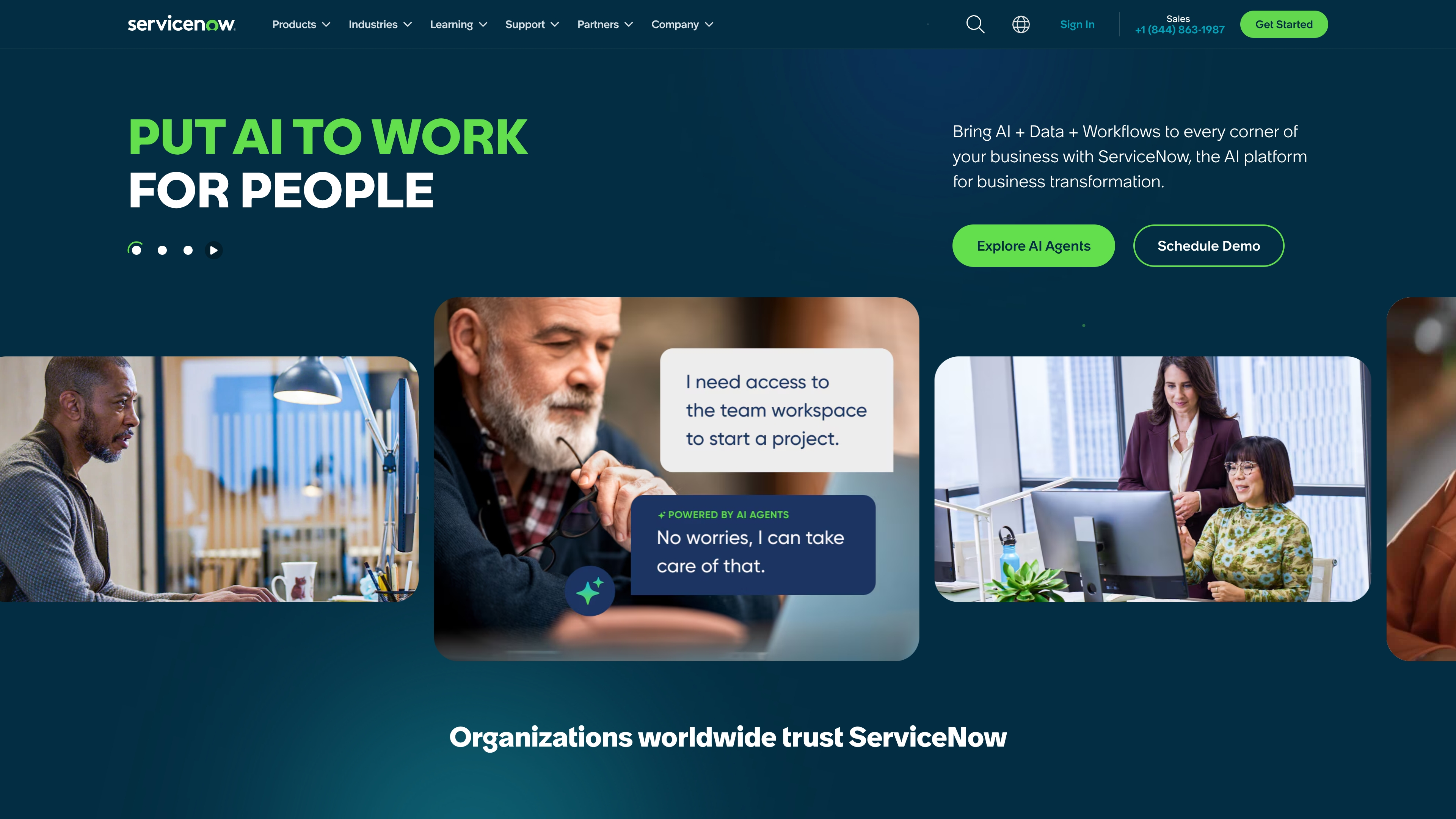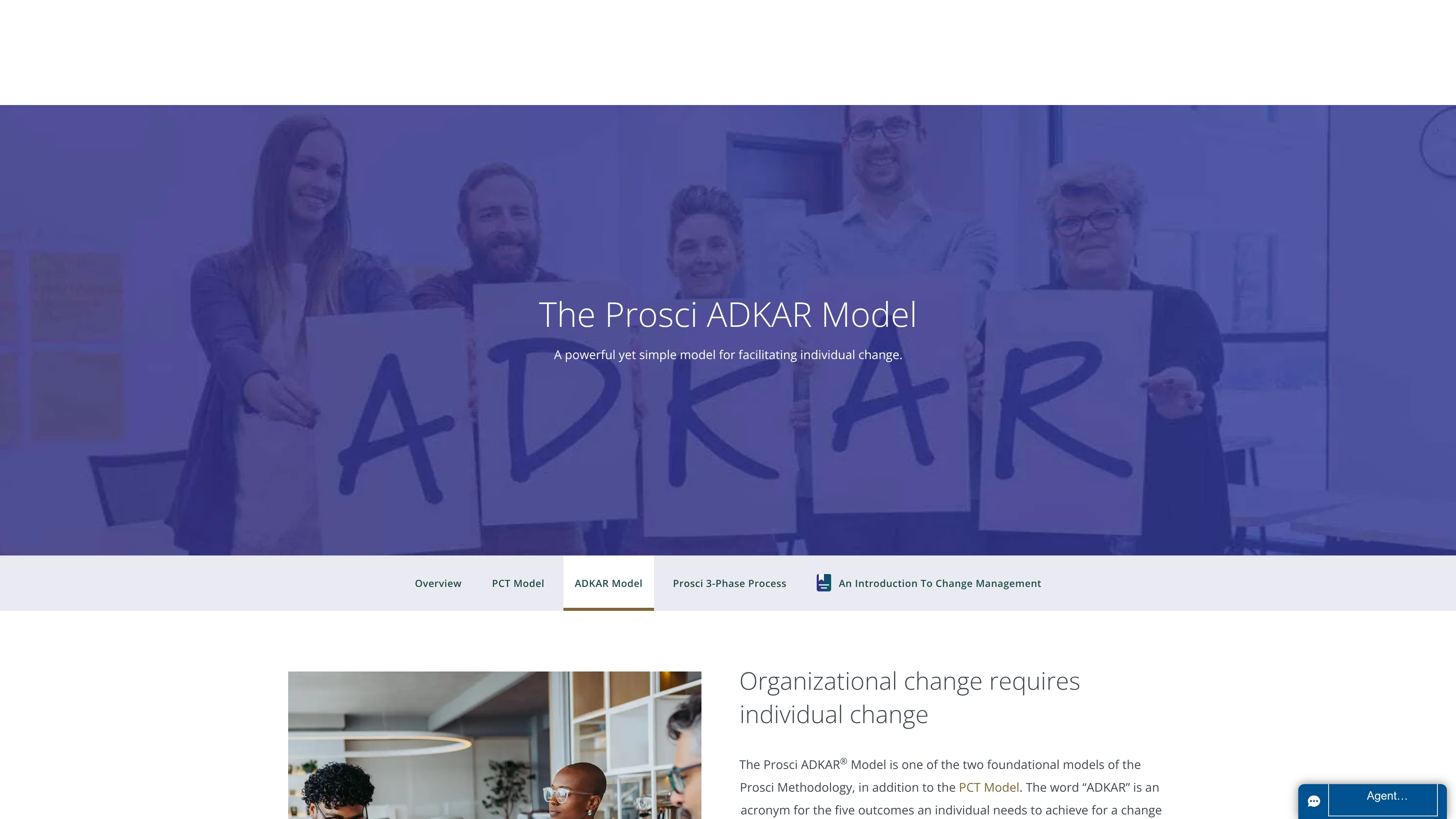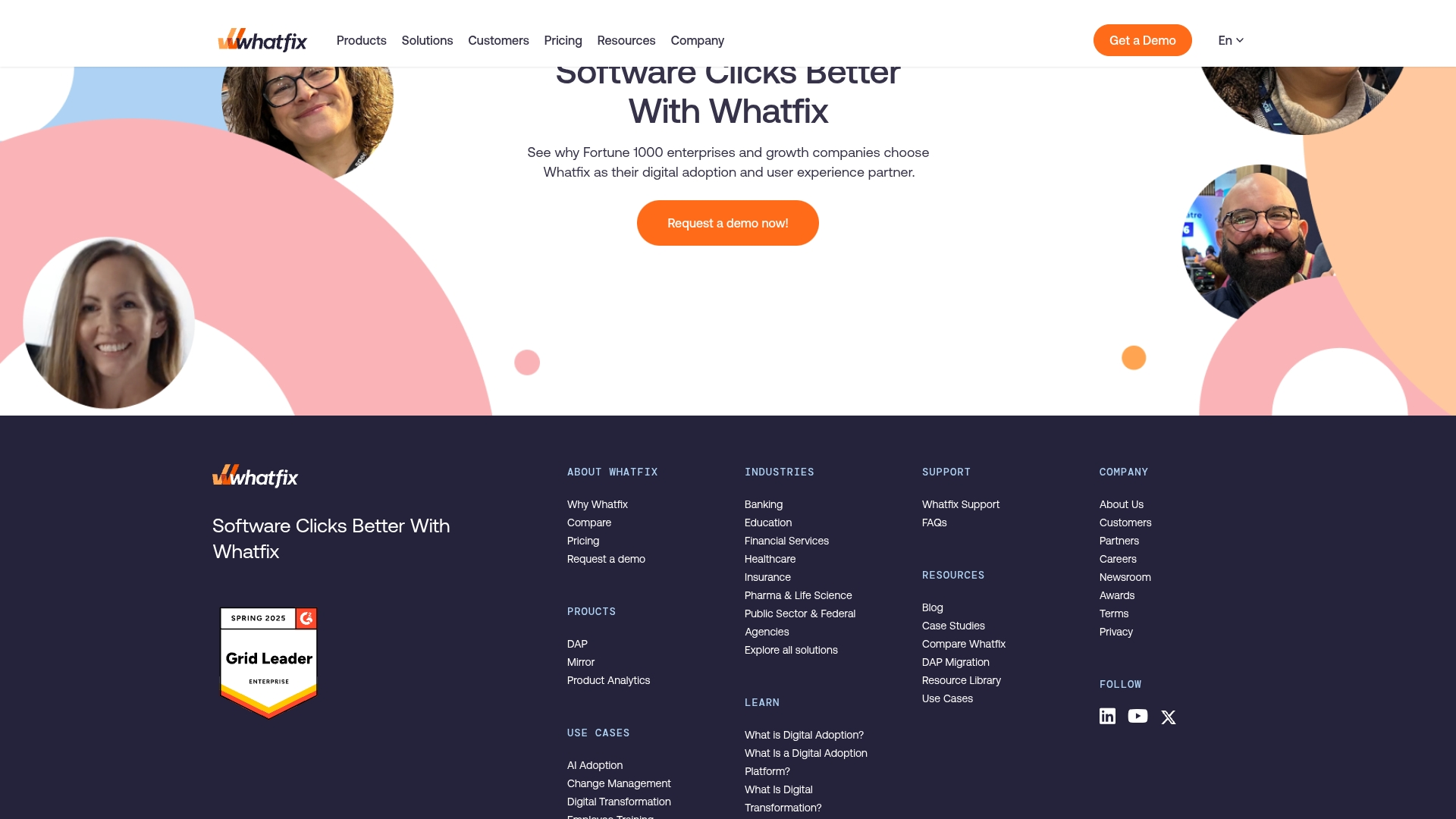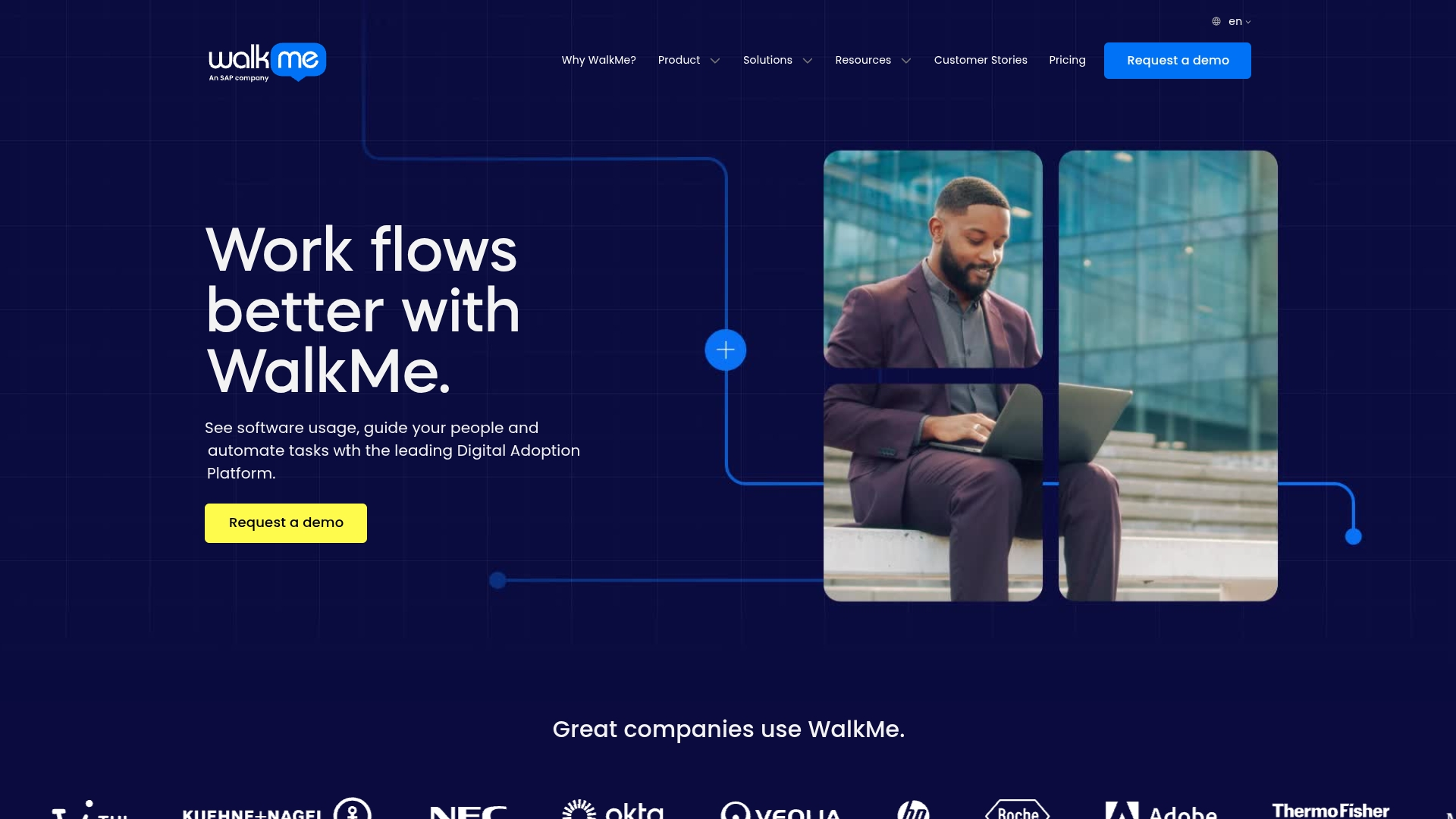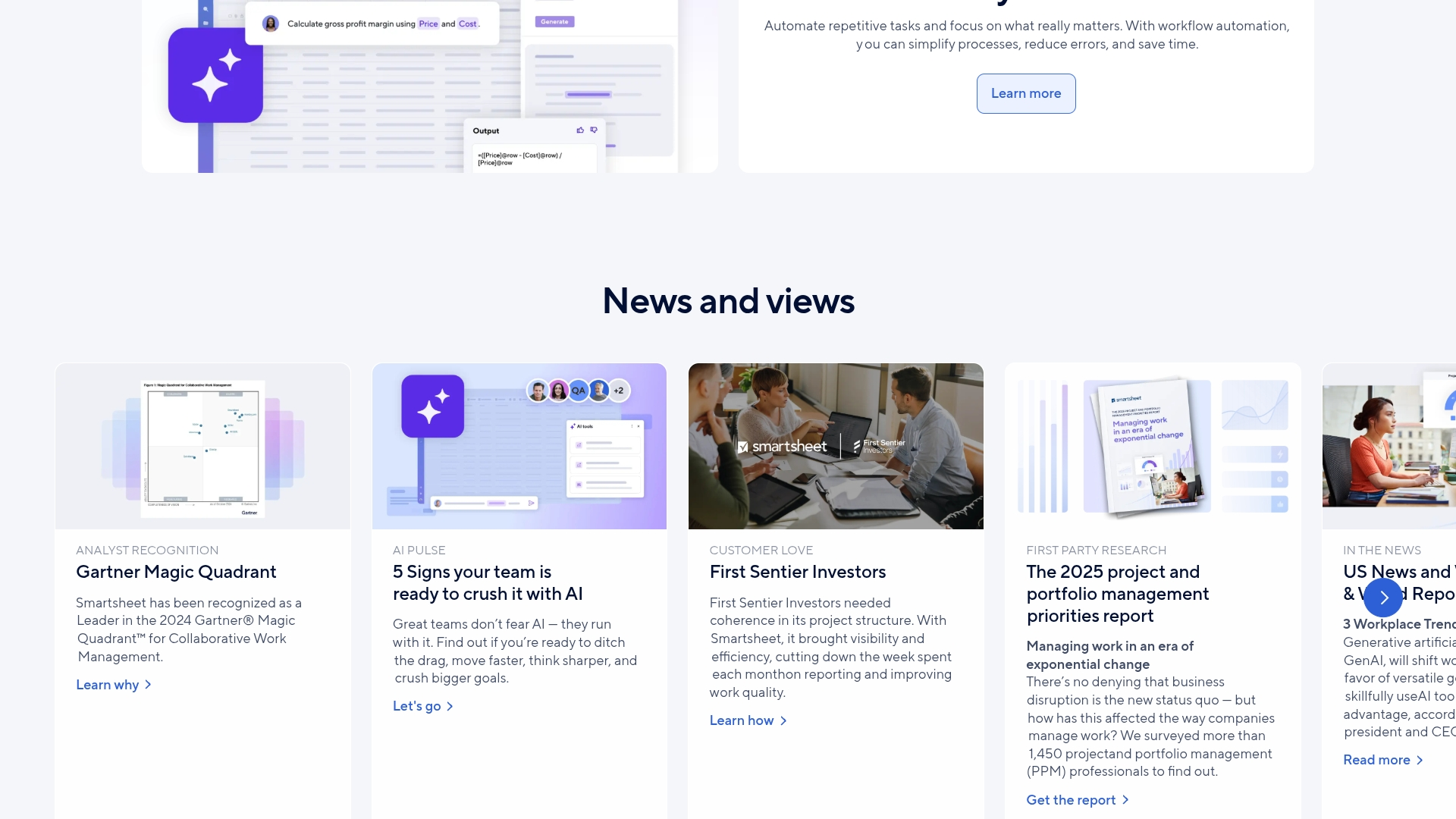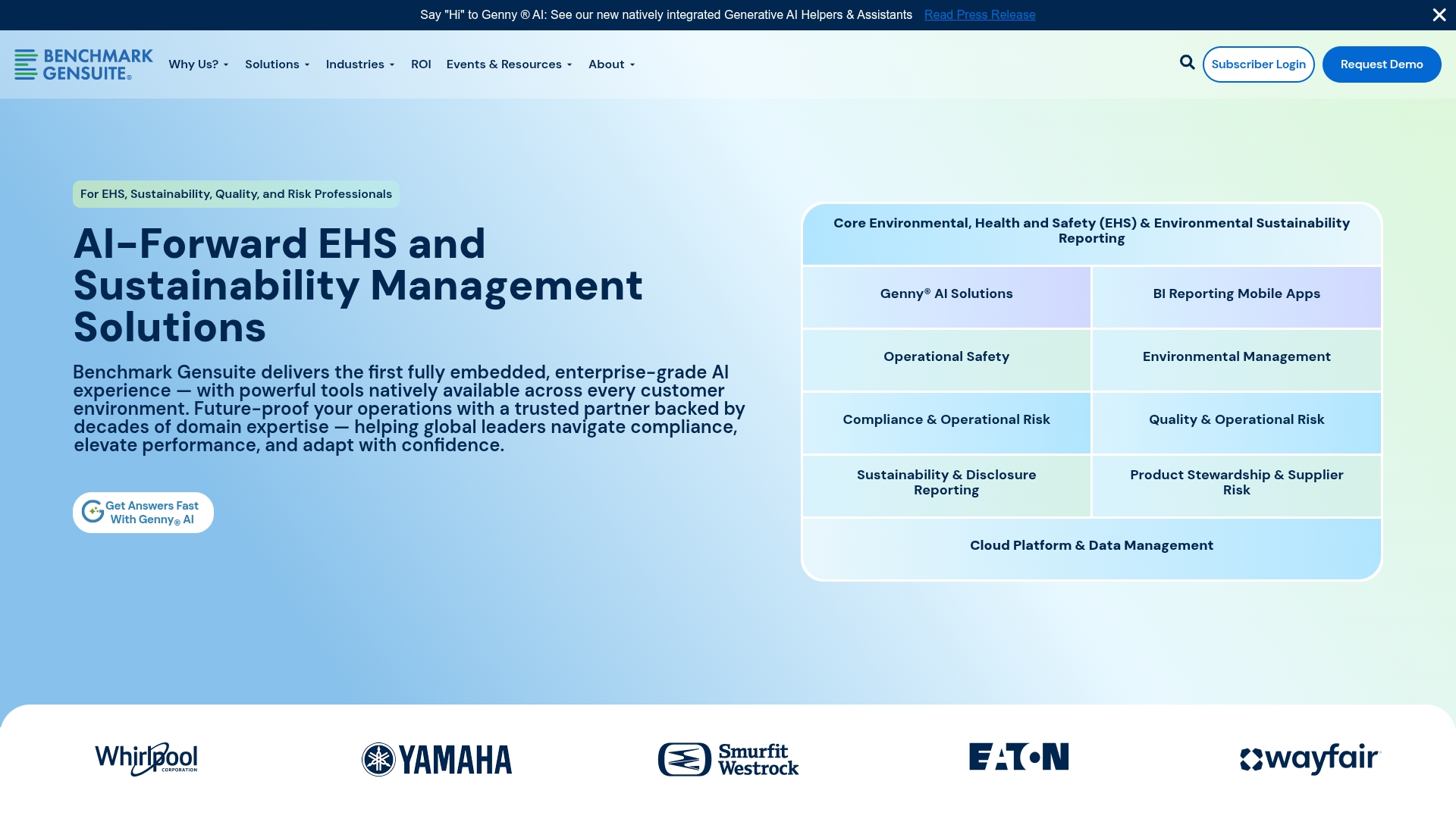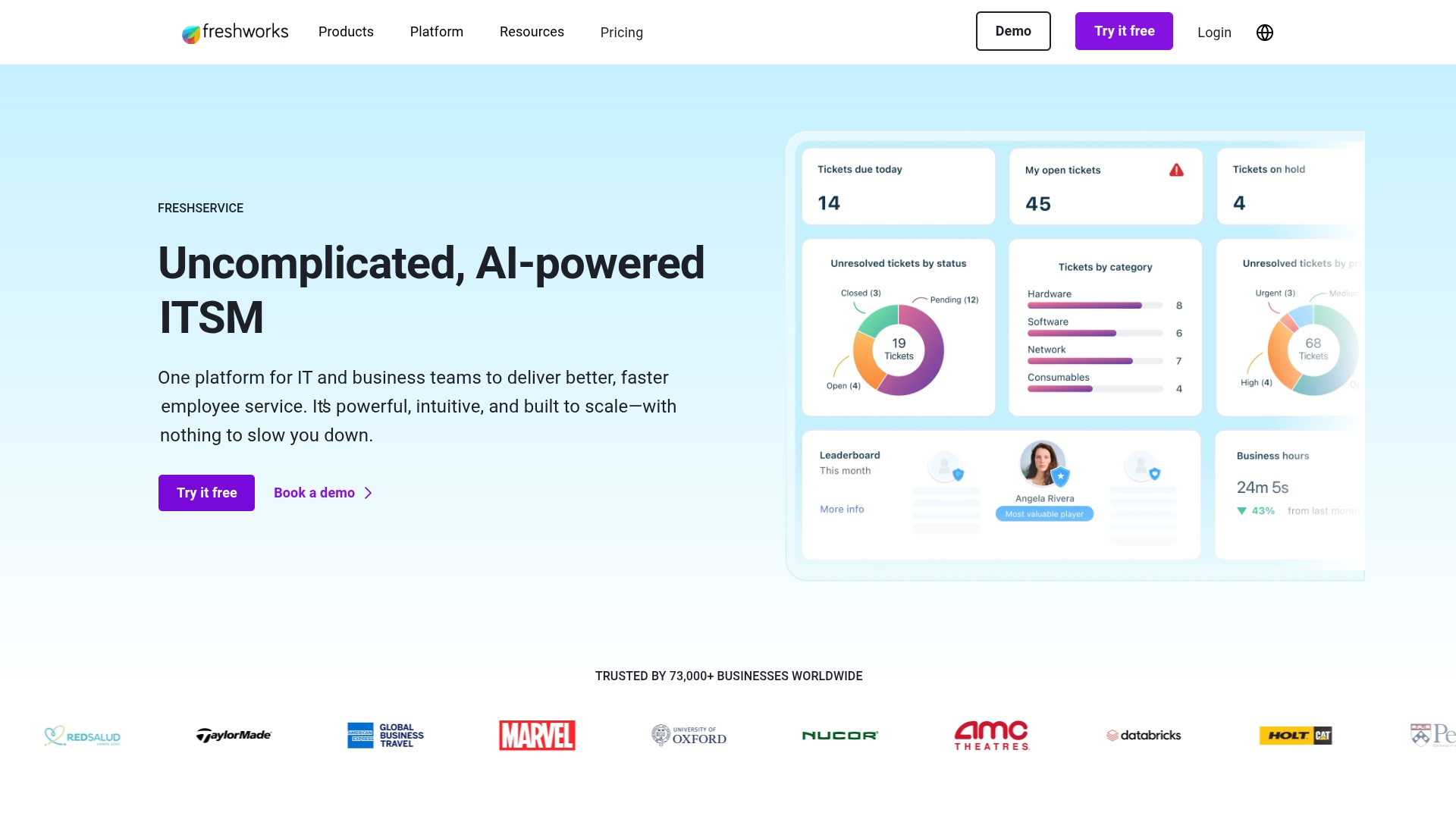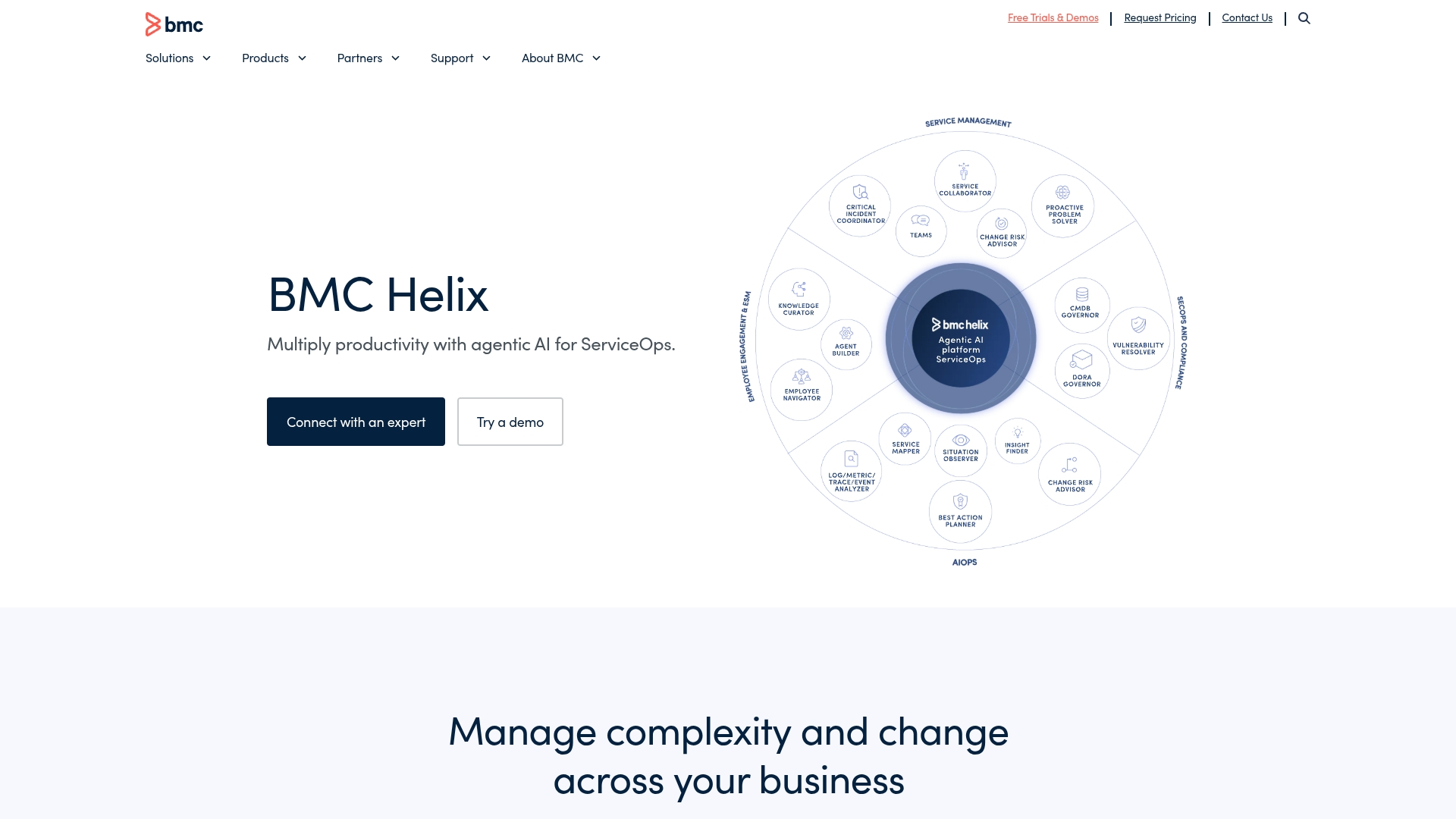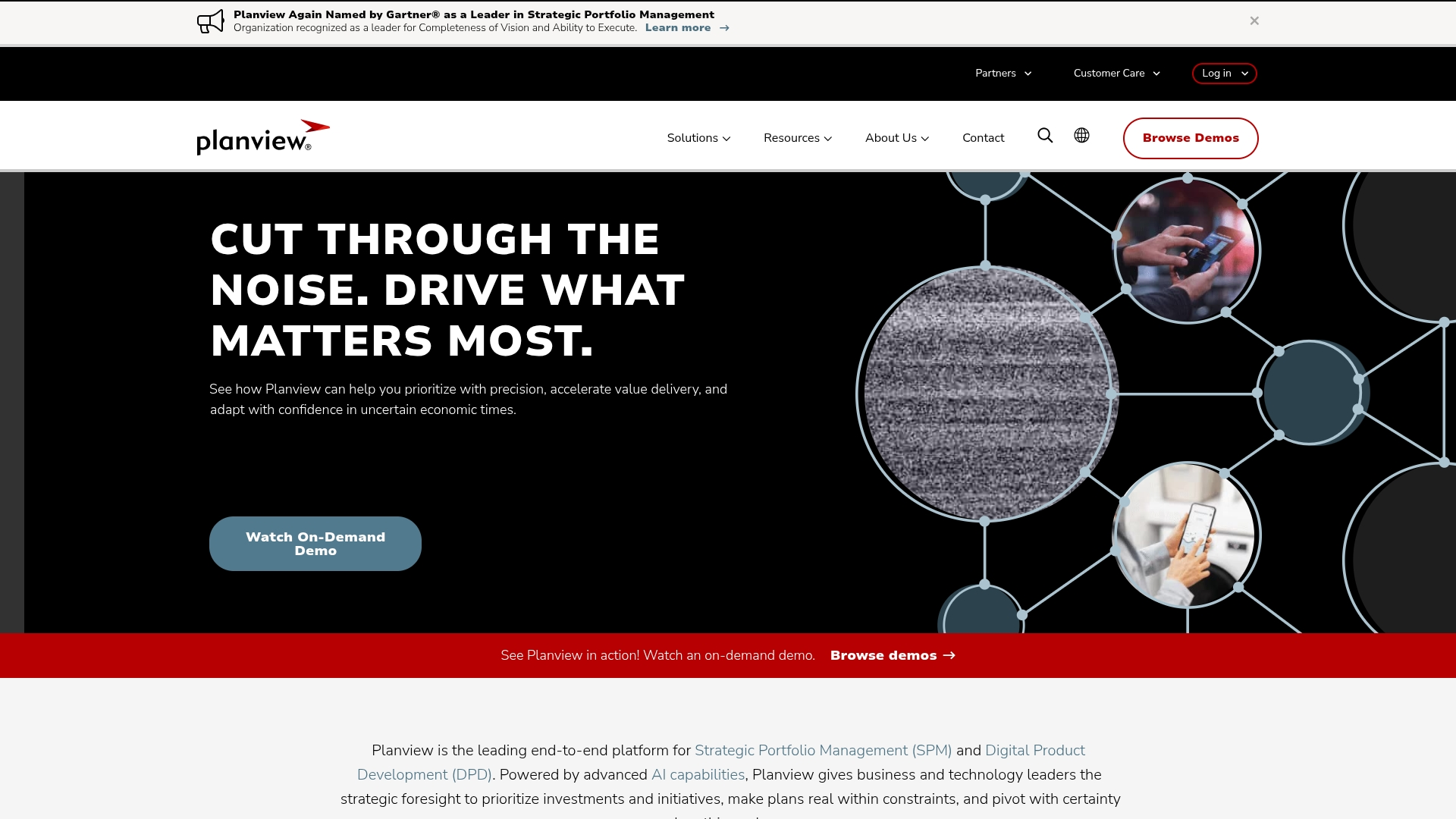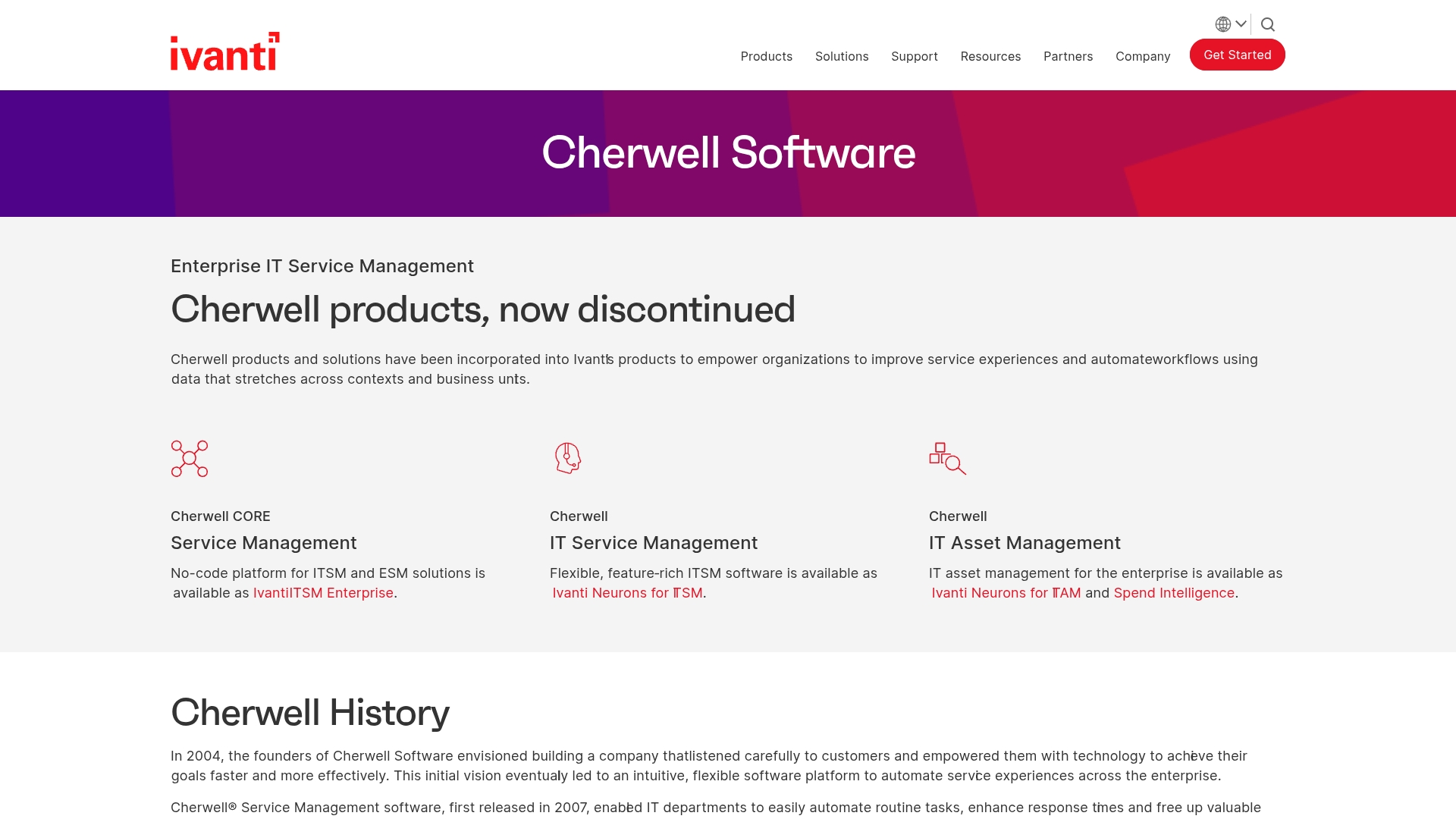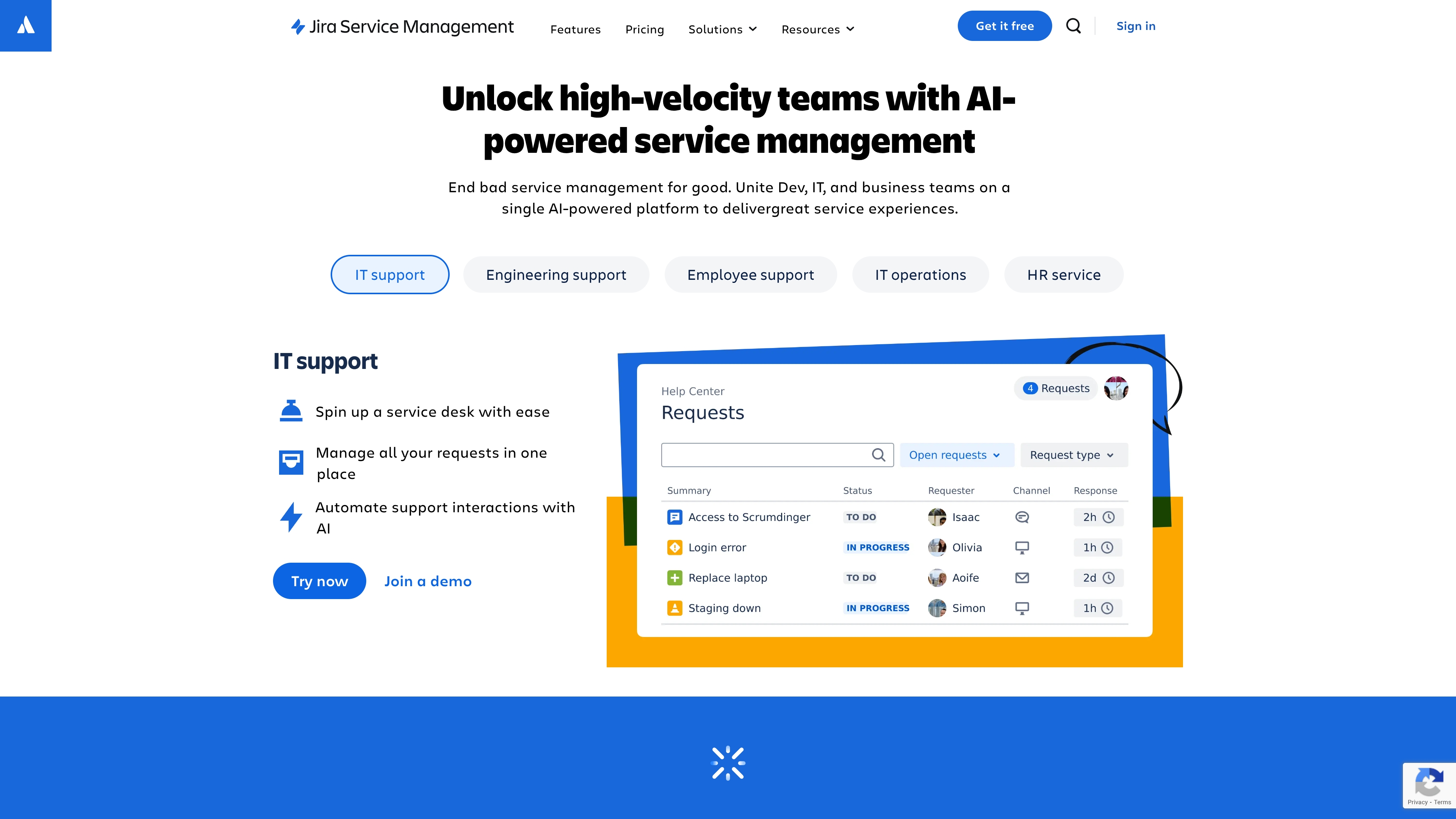Great change strategies need the right foundation to succeed. When your team uses a dedicated change control management tool, you bring all communication, tracking, and feedback into one organized space. This unified approach makes it easy to keep everyone aligned, accelerate momentum, and keep your change initiatives moving forward smoothly.
This guide explores the best change management platforms available today. We will walk through 15 top options, including monday work management, and break down how to choose the right one for your team. Plus, learn how to use features like real-time reporting and automation to lead transitions with confidence, and get a helpful change management plan template.
Try monday work managementWhat is a change management tool?
Think of a change management tool as your team’s playbook for navigating big shifts. It turns complex transitions, from launching new software to restructuring departments, into a clear, step-by-step plan that keeps everyone aligned and moving forward together.
Instead of relying on scattered emails and siloed spreadsheets, these platforms centralize every part of the process. This gives your team a single source of truth to track progress, resource management, and communicate effectively, turning potential chaos into streamlined execution.
The real goal is to guide your people through change with clarity and confidence. Strong communication and alignment techniques help teams stay united when challenges arise. By making the entire process visible and collaborative, you empower your team to adapt quickly, overcome roadblocks, and build momentum toward the finish line.
Why use a software change management solution?
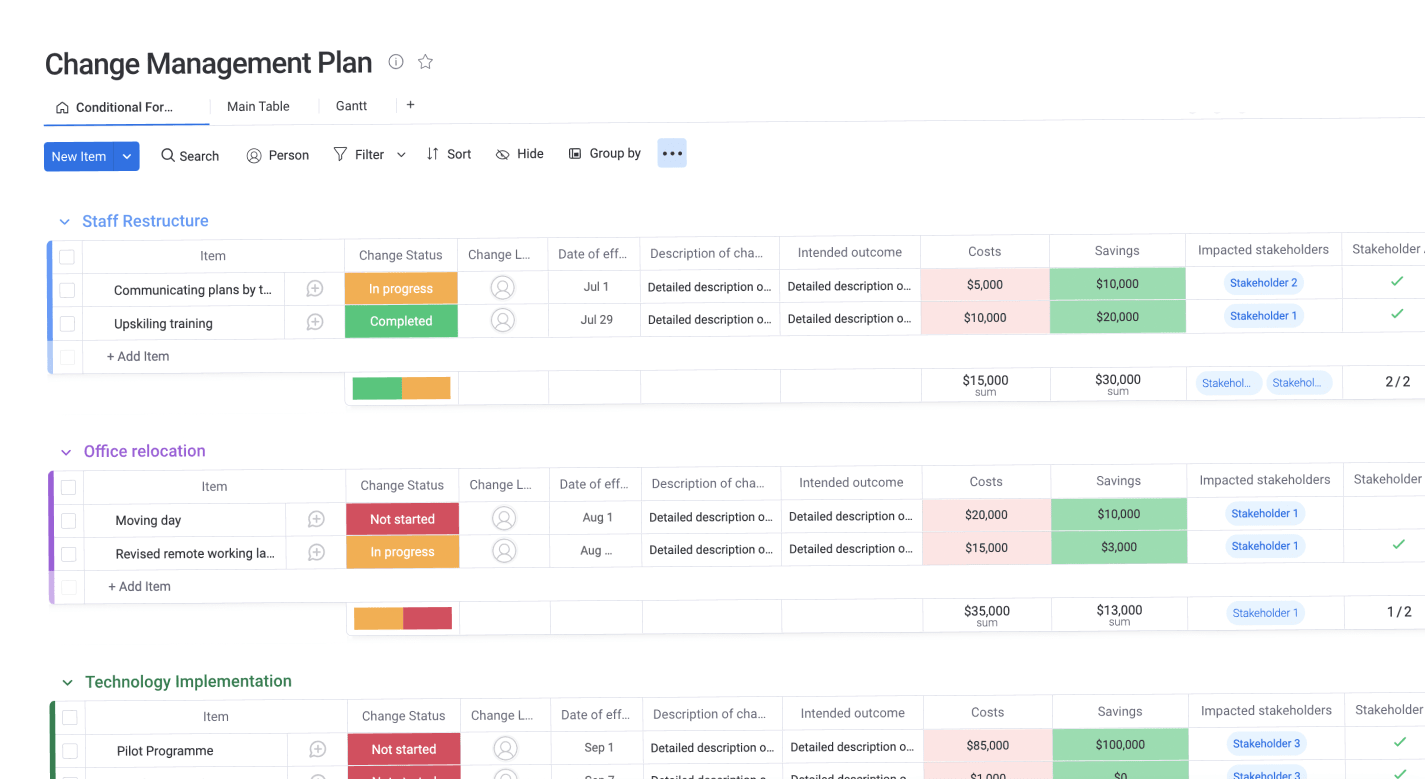
As your team adapts to new tools and shifting priorities, the ways you manage that change can easily fall behind, especially if you’re still relying on spreadsheets and scattered email chains. These outdated methods create confusion and slow your momentum. Modern change management platforms cut through this noise, unifying all your change initiatives in a single, visual space where your team can move forward together.
But this new generation of solutions goes far beyond basic task tracking. With real-time visibility, role-based dashboards, and instant updates, you build momentum and confidence across your organization. AI-powered insights now play a critical role: they surface patterns in adoption, highlight potential resistance early, and even suggest optimization strategies before issues arise. That means you’re not just managing change — you’re leading it with clarity, speed, and data-driven confidence.
Research backs this up: According to Prosci, organizations that apply effective change management are 7× more likely to meet objectives, 5× more likely to stay on schedule, and 1.5× more likely to stay on budget.In other words, the right solution doesn’t just keep change organized — it dramatically improves your odds of success.
Today’s smartest platforms bridge the gap between strategy and execution, tying every initiative to the real work happening across your teams. Understanding the difference between work management and project management clarifies how ongoing, process-driven activities differ from milestone-based projects — and in software-driven environments, recognizing how release management differs from project management is just as important.
With built-in AI and automation, the right platform turns scattered, manual efforts into a streamlined, proactive process, making organizational change smoother, faster, and far less disruptive.
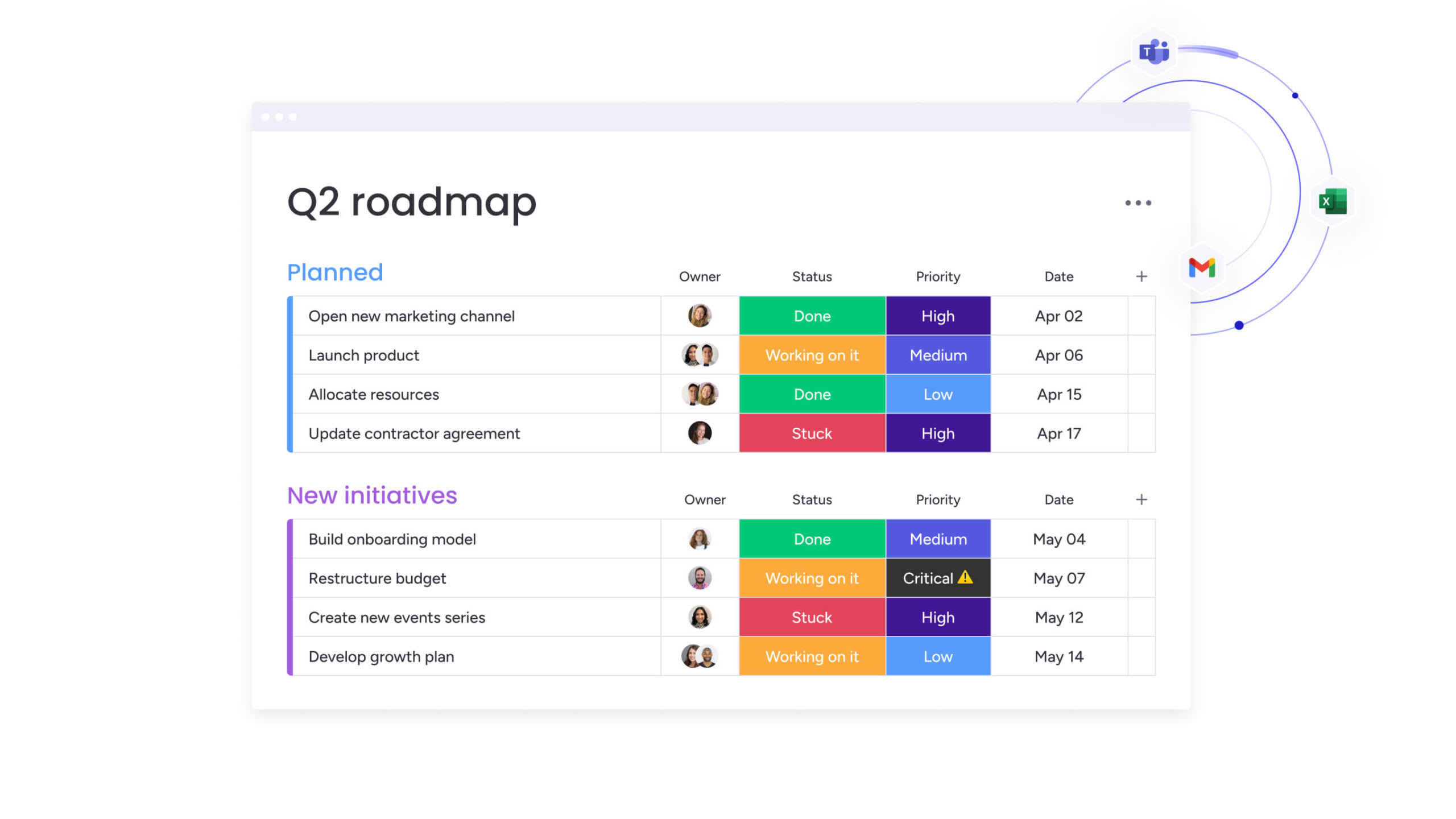
15 best change management tools for seamless transitions
Navigating organizational change is a given, but how your team responds determines whether you unlock momentum or get stuck in the churn. The right change management platform turns uncertainty into structured action, equipping you with visibility, alignment, and tools to tackle any scope change without missing a beat.
To help you find the ideal fit, here’s a table of the top 15 change management tools, so you can quickly compare options and choose a solution tailored to your team’s needs (and budget). This way, you can minimize scope creep and lead change with confidence, no matter the size or complexity of your organization.
| Platform | Use case | Free plan? | Notable feature | Starting price (paid) |
|---|---|---|---|---|
| monday work management | End-to-end change tracking and collaboration | Yes | Customizable, no-code workflows with real-time dashboards | $9/seat/month |
| ChangeScout | Enterprise transformation with consulting support | No | Deloitte methodology + Salesforce integration | Custom/Contact Deloitte |
| changeplan | Stakeholder-focused transformation planning | No | Scenario modeling and HR integrations | Custom/Contact for quote |
| ServiceNow | ITSM-driven change automation | No | Automated risk and approval workflows | Custom/Contact ServiceNow |
| Prosci ADKAR | People-centric change adoption | No | ADKAR framework and certification programs | $4,500 (training program) |
| Whatfix | In-app digital adoption for new software/processes | No | Real-time, interactive user guidance | Custom/Contact for quote |
| Applearn | Role-based software onboarding and training | No | Personalized learning paths in-app | Custom/Contact for quote |
| WalkMe | Enterprise digital adoption at scale | No | AI-powered workflow automation | Custom/Contact for quote |
| Smartsheet | Spreadsheet-style project/change tracking | No | Change management templates and automation | $12/user/month |
| Gensuite | Compliance-focused change for regulated industries | No | Automated audit trails and compliance tracking | Custom/Contact for quote |
| Freshservice | IT change management with ITIL alignment | Yes | Automated ITSM workflows and approvals | $16.83/agent/month |
| BMC Helix | AI-powered IT change risk/automation | No | Predictive risk analysis for IT changes | Custom/Contact BMC |
| Planview | Enterprise portfolio and change management | No | Portfolio-level change visibility and resource planning | Custom/Contact Planview |
| Cherwell | Configurable IT/business change workflows | No | No-code drag-and-drop process designer | Custom/Contact Ivanti |
| Jira Service Management | Agile ITSM & DevOps change management | Yes | Integrated change tracking with Jira Software | $7.53/user/month |
Explore the detailed reviews below to see how each of these platforms can turn change from a hurdle into a strategic advantage for your team.
1. monday work management
Turning organizational change into a strategic advantage is possible with a flexible Work OS platform like monday work management. With a focus on visual change tracking and seamless cross-departmental collaboration, it’s a smart choice for enterprises that need to manage complex transformation initiatives without the chaos.
Use case: Organizations seeking a comprehensive change management solution that connects strategy to execution while providing real-time visibility into adoption progress across all departments.
Key features
- Change impact assessment workflows that map dependencies and identify affected stakeholders across departments
- Adoption tracking dashboards that visualize progress metrics, resistance patterns, and success indicators in real-time
- Stakeholder communication management with automated updates, feedback collection, and engagement monitoring throughout the change process
Pricing
- Free: $0 forever for up to 2 seats with basic features
- Basic: $9 per seat/month (billed annually) with unlimited viewers and 5GB storage
- Standard: $12 per seat/month (billed annually) with timeline views and 250 automation actions
- Pro: $19 per seat/month (billed annually) with advanced features and 25,000 automation actions
- Enterprise: Custom pricing with enterprise-scale automations and advanced security
- Annual plans save 18% compared to monthly billing
- Nonprofit organizations may qualify for additional discounts
Why it stands out
- No-code customization allows teams to build change management workflows without technical expertise
- Seamless integration with 200+ business applications creates a unified change management ecosystem
- AI-powered insights help identify potential roadblocks and suggest optimization strategies
Advanced AI features
- AI-powered risk identification analyzes project data to flag potential adoption issues and resistance patterns across portfolios
- Intelligent project planning creates detailed change management plans with AI-suggested tasks, phases, and timelines based on historical data
- Smart categorization automatically organizes change requests and feedback at scale, helping teams prioritize initiatives effectively
Automation features
- Pre-built automation recipes for common change management scenarios like approval workflows, status updates, and stakeholder notifications
- Enterprise-scale automation capabilities handling up to 250,000 actions per month for large transformation programs
- Conditional logic automation that triggers specific actions based on change adoption metrics and milestone completion
Integration features
- Native integrations with 200+ popular enterprise applications including Slack, Microsoft Teams, and Google Workspace
- API access enables custom integrations with proprietary systems and specialized change management applications
- Real-time data synchronization ensures all stakeholders work with the most current information across platforms
2. ChangeScout
Leveraging Deloitte’s proven methodology and built on Salesforce, ChangeScout provides an enterprise-grade solution for large-scale organizational transformations. This comprehensive platform combines consulting expertise with sophisticated technology, specializing in data-driven insights and stakeholder engagement tracking for complex initiatives like digital transformations and system implementations. Skilled stakeholder management ensures every leader and department remains aligned.
Use case: ChangeScout transforms how enterprises manage complex organizational change by providing a centralized platform that combines Deloitte’s methodology with AI-driven analytics for better decision-making and stakeholder engagement.
Key features
- Change impact assessments with pre-configured solutions for specific transformations like SAP S/4HANA implementations
- Stakeholder engagement tracking with automated deliverables and cross-deployment visibility
- Real-time reporting and analytics dashboards powered by AI insights for measuring change readiness
Pricing
- Custom Pricing Available only through Deloitte consulting engagements
- Enterprise focus: Pricing bundled with broader transformation consulting services
- Contact required: No publicly available pricing tiers
Considerations
- Only available as part of Deloitte consulting engagements, not as standalone software
- Limited flexibility for organizations with existing change management frameworks outside Deloitte’s methodology
3. changeplan
Designed by change management experts, changeplan offers specialized software that transforms how enterprises plan and execute complex transformations. Its exclusive focus on the people side of change provides scenario modeling and stakeholder management capabilities, giving leaders the enterprise-wide visibility that traditional project management tools lack.
Use case: changeplan serves as a comprehensive change management solution for enterprises managing multiple transformation initiatives, providing centralized visibility into stakeholder readiness, change impacts, and organizational capacity across all projects.
Key features
- Scenario modeling and planning for multiple change outcomes
- Stakeholder mapping with HR system integrations (Workday, MS Project, JIRA)
- Pulse check surveys with high response rates for real-time sentiment tracking
Pricing
- Custom Pricing Contact for enterprise quotes
- Annual billing: Per-user pricing model
- Enterprise features: Includes integrations and advanced reporting
Considerations
- Pricing transparency is limited with no publicly available rates
- Relatively new platform (launched 2021) with smaller market presence compared to established competitors
4. ServiceNow
Within its comprehensive IT service management platform, ServiceNow provides enterprise-grade change management capabilities. The solution is a go-to choice for large organizations managing mission-critical IT transformations because it excels at automating complex change workflows and integrating seamlessly with existing ITSM infrastructure.
Use case: ServiceNow transforms scattered IT change processes into unified, automated workflows that connect strategic planning with operational execution across the entire enterprise.
Key features
- Automated change workflows with built-in approval processes and risk assessment capabilities
- Deep integration with ITSM tools and comprehensive IT infrastructure management
- AI-powered risk and impact analysis to prevent change-related incidents before they occur
Pricing
- Custom pricing available upon request
- Scalable packages available for different business growth stages
- Contact ServiceNow sales for detailed quotes and implementation planning
Considerations
- Steep learning curve requires significant training investment and specialized expertise to maximize platform capabilities
- Premium pricing point may be prohibitive for smaller organizations without complex enterprise IT needs
5. Prosci ADKAR
The Prosci ADKAR model offers a research-backed methodology that places people at the center of organizational change. By focusing on the proven ADKAR framework, the platform is ideal for organizations implementing new work management systems and processes where human adoption is the critical factor for success.
Use case: Prosci ADKAR helps organizations successfully implement change management tools and processes by focusing on individual adoption through a structured five-step methodology.
Key features
- ADKAR model integration (Awareness, Desire, Knowledge, Ability, Reinforcement)
- Change readiness assessments and diagnostic tools
- Comprehensive training programs and resource libraries
Pricing
- Change Management Certification Program: $4,500 USD for standard program
- Online Training Option: $4,850 USD (includes digital content and resources)
- Custom Enterprise Solutions: Contact for pricing
Considerations
- The linear, sequential nature may not suit agile or fluid change processes
- Certification costs can be significant for organizations with multiple team members needing training
6. Whatfix
To ensure smooth digital adoption during change initiatives, Whatfix provides in-app guidance and training. The platform’s specialty is real-time, contextual user support, making it an ideal choice for companies rolling out new software or processes. Its no-code approach and AI-powered personalization turn complex software transitions into guided, intuitive experiences.
Use case: Whatfix helps organizations maximize their return on investment in technology by ensuring high user adoption and proficiency through contextual, in-app guidance and performance support.
Key features
- Interactive walkthroughs that guide users step-by-step through complex processes
- Analytics on user engagement and behavior to identify friction points
- Multi-platform support across web, desktop, and mobile applications
Pricing
- Custom quotes include a flat fee plus user license fees
- Multiple plans options available
- Add-ons for on-premise authoring, white-labeling, 24/7 support, and professional services
- Discounts may be available based on specific organizational needs
Considerations
- Analytics capabilities are more basic compared to some competitors, often requiring third-party integrations for robust reporting
- Implementation can be complex for advanced customizations, sometimes requiring CSS knowledge
7. Applearn
By layering intelligent guidance directly onto enterprise applications, Applearn addresses digital adoption challenges and creates seamless user experiences. The platform’s strength lies in its personalized, role-based learning, making it a powerful tool for organizations implementing new software or managing complex digital transformations.
Use case: Applearn helps enterprises accelerate software adoption and reduce training costs by providing contextual, in-app guidance that adapts to each user’s role and needs.
Key features
- Personalized learning paths that adapt to user roles, language, and location
- Real-time in-app guidance with contextual help and step-by-step walkthroughs
- Performance analytics dashboard that tracks user behavior and adoption rates
Pricing
Custom pricing available upon request.
Considerations
- Content creation for complex processes can be time-consuming and intricate
- Some users report the administrative interface can be over-complicated to navigate
8. WalkMe
As a leading digital adoption platform, WalkMe turns complex software adoption into a seamless user experience. It specializes in no-code workflow creation and AI-powered guidance, a combination that makes it particularly well-suited for large enterprises navigating significant digital transformation initiatives.
Use case: WalkMe serves as an intelligent overlay on existing enterprise applications, guiding employees through complex processes while automating repetitive tasks to boost productivity and reduce digital friction.
Key features
- No-code workflow automation that eliminates manual data entry and streamlines business processes
- WalkMe Workstation providing a unified hub for workflows, tasks, and resources across desktop and mobile
- AI-powered ActionBot enabling conversational task completion without navigating complex application menus
Pricing
- Custom pricing based on organizational needs and requirements
- Quote-based pricing model with no publicly listed package costs
- Pricing includes content authoring, analytics, workflow automation, and security features
Considerations
- High implementation costs may be prohibitive for smaller organizations
- Steep learning curve requiring dedicated internal resources or paid support for complex customizations
9. Smartsheet
Smartsheet bridges the gap between simple task tracking and enterprise-level project management using a familiar spreadsheet-style interface. This approach makes it perfect for organizations that need powerful functionality without abandoning the format their teams already know and use.
Use case: Smartsheet serves as a comprehensive change management solution that combines the familiarity of spreadsheets with advanced automation and collaboration features for managing organizational transformations.
Key features
- Customizable templates specifically designed for change management tracking and implementation
- Automated workflows that trigger alerts, reminders, and status updates throughout change processes
- Real-time collaboration tools including comments, file sharing, and stakeholder communication features
Pricing
- Pro: $12/month per member (billed monthly) or $120/year per member (billed annually)
- Business: $24/month per member (billed monthly) or $240/year per member (billed annually)
- Enterprise: Custom pricing for 10+ members with advanced features
- Advanced Work Management: Custom pricing with premium add-ons included
Considerations
- Advanced features like automation and complex reporting require significant time investment to master effectively
- The user interface feels less modern compared to newer change management platforms, which may impact user adoption
10. Gensuite
For regulated industries, Gensuite offers comprehensive, compliance-focused change management solutions. The platform is essential for manufacturing, healthcare, and other heavily regulated sectors because it specializes in maintaining audit trails and ensuring regulatory adherence throughout any organizational change.
Use case: Gensuite provides integrated change management tracking software that connects equipment maintenance, compliance obligations, and risk assessment in a single platform for organizations operating in regulated environments.
Key features
- Comprehensive compliance tracking with automated audit trails for all change management activities
- Risk assessment tools that evaluate potential impacts before implementing organizational changes
- Equipment and maintenance management integrated with change control processes
Pricing
- Custom quotes based on organization size, industry requirements, and desired modules
- No per-user licensing fees with unlimited user access included
- One-time setup and deployment service fee applies
Considerations
- User interface can feel cluttered and overwhelming for teams new to the platform
- Limited customization options due to the “no custom builds” philosophy may not suit organizations with unique workflow requirements
11. Freshservice
With its integrated change management capabilities, Freshservice provides a comprehensive IT service management solution that streamlines approval workflows and automates notifications. The platform’s focus on ITIL-based change control processes makes it an ideal fit for IT teams managing complex infrastructure changes and service delivery.
Use case: Freshservice provides a unified platform for IT teams to manage service delivery and change management processes, integrating project management with ITSM workflows to eliminate silos between service operations and change execution.
Key features
- Change approval workflows with automated routing and notifications
- Integration with IT operations for seamless change implementation
- ITIL-compliant change management processes with risk assessment capabilities
Pricing
- Starter: $16.83/agent/month (includes core ITIL modules and SLA management)
- Growth: Higher-tier pricing with advanced features
- Pro: Advanced automation and project management capabilities
- Enterprise: Full enterprise reporting and customization options
- Free plan available for up to three agents with 21-day trial for paid plans
Considerations
- Advanced work management features are restricted to higher-tier Pro and Enterprise plans
- Mobile app functionality is limited compared to the desktop version
12. BMC Helix
AI-powered IT change management and automation are the cornerstones of BMC Helix, a platform designed for enterprise organizations. Its specialization in intelligent risk analysis and automated workflows makes it a strong choice for large companies managing complex IT environments and DevOps integrations.
Use case: BMC Helix transforms IT change management through AI-driven automation and risk prediction, helping enterprises minimize disruptions while accelerating change delivery.
Key features
- AI-powered risk analysis that predicts potential change impacts before implementation
- Automated change scheduling with intelligent workflow orchestration
- Seamless integration with DevOps tools and enterprise systems
Pricing
Custom pricing available upon request.
Considerations
- Complex implementation process that may require specialized vendor support and training
- High cost structure that can be prohibitive for small to mid-sized organizations
13. Planview
For enterprise PMOs seeking to connect strategy with execution, Planview provides comprehensive portfolio and change management. With over 30 years in the market, the platform is adept at managing multiple change initiatives across large organizations, making it a trusted choice for Fortune 100 companies navigating complex transformations.
Use case: Planview enables enterprise PMOs to manage portfolio-wide change initiatives with end-to-end visibility from strategic planning through team execution.
Key features
- Portfolio-level change tracking across multiple initiatives and departments
- Advanced resource management with capacity planning and scenario analysis
- Strategic portfolio management connecting organizational goals to project delivery
Pricing
- Custom pricing available upon request
- Free 30-day fully-functional trial available with no credit card required
- Single all-inclusive pricing plan with 100% platform functionality for every user
Considerations
- Steep learning curve for advanced features may require extensive training
- Complex initial setup and configuration can be time-consuming for new implementations
14. Cherwell
Now part of Ivanti’s portfolio, Cherwell provides highly configurable IT and business change management through its Service Management platform. Its specialization in drag-and-drop workflow design and ITIL-verified processes makes it a flexible option for midsize to large enterprises seeking customizable solutions.
Use case: Cherwell excels at automating complex change workflows across IT and business units, enabling organizations to maintain compliance while reducing manual oversight through its no-code/low-code platform capabilities.
Key features
- Drag-and-drop workflow designer for creating custom change processes without coding
- Integration capabilities with ITSM and business systems for seamless data flow
- Change calendar functionality for scheduling and tracking organizational changes
Pricing
Custom pricing available upon request.
Considerations
- Learning curve associated with the user interface may require additional training investment
- Limited mobile application options following retirement of company-developed apps in 2019
15. Jira service management
Built for agile teams, Jira Service Management enhances IT service delivery with powerful, integrated change management capabilities. The platform excels at bridging the gap between IT operations and software development by integrating seamlessly with existing development workflows.
Use case: Jira Service Management excels at managing IT changes within organizations that already use Atlassian’s ecosystem, providing seamless integration between service management and development workflows.
Key features
- Change request tracking with automated approval workflows and risk assessment
- Deep integration with Jira Software for end-to-end visibility from development to deployment
- Automation rules that eliminate manual tasks and accelerate change implementation
Pricing
- Free: $0/month for up to 10 users with 2 GB storage
- Standard: $7.53/user/month with 250 GB storage and business hours support
- Premium: $13.53/user/month with unlimited storage and 24/7 support
- Enterprise: Custom pricing with 30-minute response times and 99.95% uptime SLA
Considerations
- Initial setup and configuration can be complex for teams new to the Atlassian ecosystem
- Mobile app functionality is limited compared to the desktop experience
How to choose the right change management platform
Ready to find the right change management platform for your team? Here’s a simple step-by-step process to guide your decision:
- Define your goals and challenges. What are you hoping to achieve with a change management platform? Are you looking to streamline communication, track adoption, ensure compliance, or all of the above? Pinpoint your core needs before you start comparing solutions.
- Map your current workflows. Make a list of the tools your team already uses (project management, HR, communication, etc.), because the right platform will connect seamlessly with your existing systems.
- Assess flexibility and scalability. Can the platform adapt to your way of working, whether you use ADKAR, Kotter, or a custom approach? Choose a solution that supports your methodology and grows with your organization.
- Prioritize user experience. Look for intuitive dashboards, no-code customizations, and role-based views. The easier it is for your team to use, the faster you’ll see results.
- Compare features and pricing. Use the table below to quickly identify which options best fit your organization’s size, needs, and budget.
- Test and gather feedback. Take advantage of free trials or demos. Involve end users in the process to ensure the platform feels right for everyone — not just leadership.
Remember, the right platform doesn’t just help you manage change. It empowers you to build a more agile, resilient, and aligned team. Use this table to jumpstart your search, but trust your understanding of your organization as your ultimate guide.
| Organization type | Primary needs | Recommended features |
|---|---|---|
| Small business | Simplicity, affordability, easy onboarding | Customizable templates, basic tracking, user-friendly interface |
| Mid-market | Integration, reporting, stakeholder management | Automated workflows, analytics, multi-system integration |
| Enterprise | Scalability, compliance, advanced analytics | Portfolio management, AI-driven insights, robust security |
Key capabilities to look for in a change management tool
- Real-time visibility and reporting: Instantly track progress, adoption, and roadblocks across all your change initiatives with live dashboards — no more status meeting marathons or hunting down updates in scattered systems.
- Customizable, role-based views: Equip every team member, manager, and executive with the information and context they need — nothing more, nothing less — through personalized dashboards and workflows that drive clarity and faster adoption.
- Automated workflows and approvals: Streamline change requests, approvals, and stakeholder notifications with automation that eliminates bottlenecks and ensures nothing slips through the cracks.
- Seamless integrations: Connect your work management, IT, HR, and communication tools for a unified change ecosystem, so every update, approval, and compliance step is always in sync and visible.
- Stakeholder engagement and communication: Centralize feedback, announcements, and training resources to ensure buy-in, reduce resistance, and keep every stakeholder in the loop from day one.
- AI-powered insights and risk detection: Surface hidden patterns, predict resistance, and get data-driven suggestions to optimize your change strategy, so you can move from reactive to proactive leadership.
- Scalability and flexibility: Adapt easily to your organization’s size, structure, and change methodologies, whether you’re running small improvements or enterprise-wide transformations.
- Compliance, audit, and security controls: Maintain a complete audit trail, meet regulatory requirements, and protect sensitive data as you manage change at scale.
- User-friendly experience: Intuitive interfaces, no-code customization, and in-app guidance ensure your team is set up for success — no technical expertise required.
- Resource and capacity management: Visualize and optimize workloads so you can allocate the right resources, prevent burnout, and deliver change without disruption.
When your change management tool checks all these boxes, you’re empowered to lead with confidence—turning every transition into an opportunity for growth, not chaos.
Free change management plan template
A solid plan makes change feel less like disruption and more like progress. While every organization’s needs are unique, most effective change management plans include a few consistent elements:
- Goals and success metrics: What are you trying to achieve, and how will you measure adoption?
- Stakeholder analysis: Who’s impacted, and what role do they play?
- Communication plan: How will you keep teams informed and engaged?
- Training and support: What resources will employees need to adapt quickly?
- Timeline and milestones: What does the transition look like step by step?
You can download our free change management plan template and customize it directly in monday work management, connecting tasks, communication, and reporting in one place so nothing slips through the cracks.
Your roadmap to confident change leadership
Change is the deciding factor between teams that thrive and those that fall behind, and the right approach drives true alignment, engagement, and growth. When you centralize your change strategy, communication, and execution in one unified platform, you turn uncertainty into momentum and empower every person to move forward together.
Ready to make change your team’s greatest advantage? Lead every transition with clarity, confidence, and control. Don’t just manage change — master it with monday work management.
Try monday work managementFAQs
What is the difference between change management software and project management software?
Project management software plans tasks and timelines, while change management software guides people through transitions. With monday work management, you get both so you can manage the project and support your team in one place.
How do change management tools help reduce employee resistance?
These tools reduce resistance by creating a single source of truth for communication, progress, and feedback. Transparency helps employees understand the "why" behind a change, which builds trust and encourages adoption.
What are the 5 Cs of change management that these tools support?
The 5 Cs are communication, collaboration, commitment, culture, and capability. A good platform supports these by centralizing updates, enabling teamwork, and providing clear roadmaps that build buy-in.
How much does enterprise change management software typically cost?
Enterprise change management software typically ranges from $20 to over $100 per user per month, based on features and team size. This investment helps avoid the significant financial impact of failed initiatives by improving adoption and alignment.
Can change management tools integrate with existing HR and communication systems?
Yes, leading platforms integrate with common HR, communication, and project management tools. This creates a connected system that supports your workflows without disrupting the tools your teams already use.
How long does it take to implement and see results from a change management platform?
Implementation can take anywhere from a few weeks to a few months, depending on your organization's complexity. You can often see measurable results, like improved engagement and clearer communication, within the first quarter.

